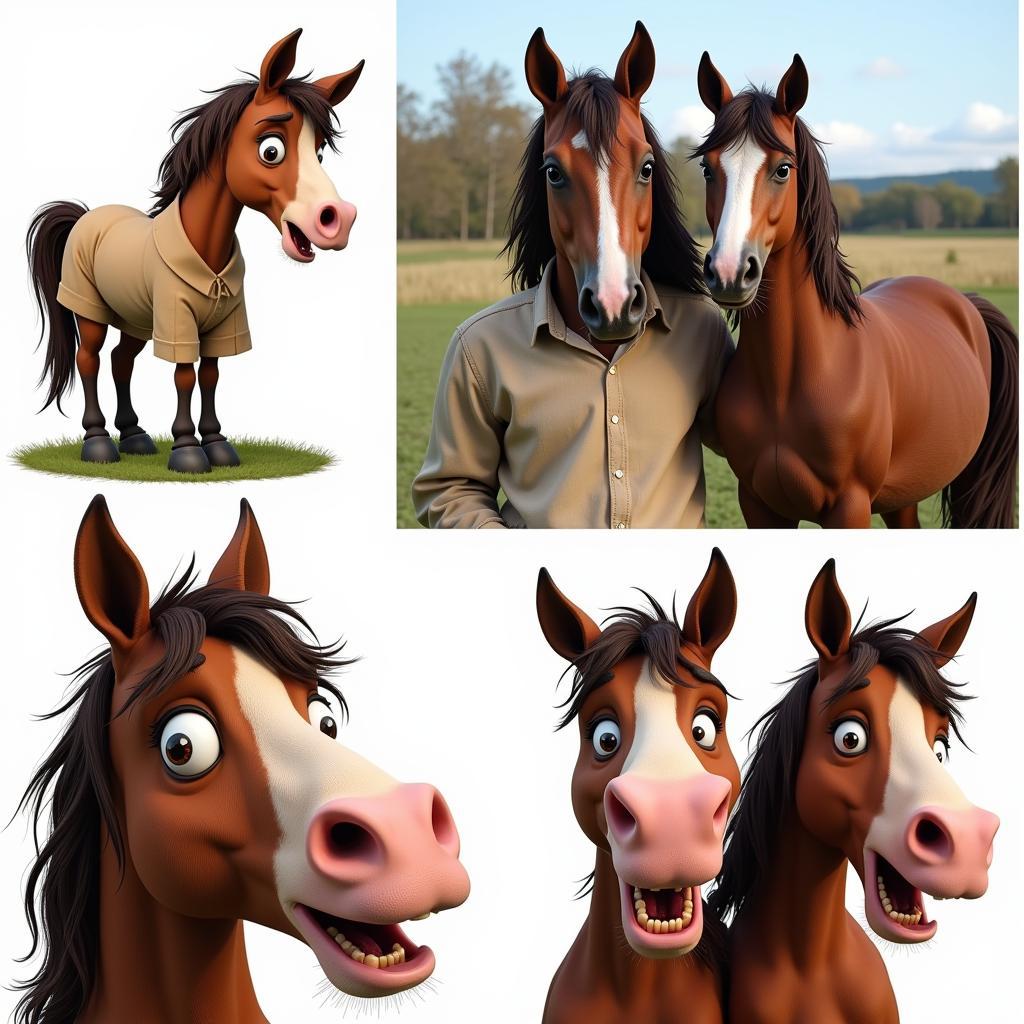Anthropomorphic Horse, the concept of giving human-like qualities to horses, is a fascinating intersection of our love for these magnificent creatures and our tendency to project human emotions and characteristics onto them. This article delves into the various facets of this phenomenon, exploring its presence in popular culture, its psychological underpinnings, and its potential impact on our relationship with horses.
Anthropomorphism: Seeing Ourselves in Horses
Anthropomorphism, in its simplest form, is attributing human traits, emotions, and intentions to non-human entities, including animals. With horses, this can manifest in various ways, from interpreting a nicker as a greeting to believing a horse is feeling “guilty” after misbehaving. While sometimes endearing, it’s crucial to understand the implications of anthropomorphic thinking in our interactions with horses.
 Examples of Anthropomorphic Horse Portrayals
Examples of Anthropomorphic Horse Portrayals
The Psychology Behind Anthropomorphic Horse
Why do we anthropomorphize horses? Several psychological factors contribute to this tendency. Our inherent desire for connection and companionship can lead us to seek emotional bonds with animals, even projecting our own feelings onto them. Additionally, our advanced cognitive abilities allow us to recognize patterns and interpret behaviors, sometimes leading us to ascribe human-like motivations to actions that have entirely different origins in the equine world.
Anthropomorphic Horse in Popular Culture
The anthropomorphic horse is a prevalent figure in literature, film, and art. From talking horses like Mr. Ed to majestic steeds with seemingly human intelligence in fantasy novels, these portrayals shape our perceptions and expectations of horses. While these fictional representations can be entertaining, they can also blur the lines between reality and fantasy, potentially influencing how we interact with real horses.
The Impact of Anthropomorphism on Horse Care
While seeing our own emotions in horses can strengthen the human-animal bond, it’s vital to remember that horses don’t experience the world in the same way we do. Attributing human emotions to horses can lead to misinterpretations of their behavior, hindering effective training and potentially compromising their welfare. Understanding equine ethology, the study of horse behavior, is essential for providing appropriate care and building a genuine, respectful relationship.
Anthropomorphic Horse: Finding the Balance
Appreciating horses for their unique equine qualities is key to a harmonious relationship. While it’s natural to feel affection and connection, relying solely on anthropomorphic interpretations can lead to misunderstandings and unmet expectations. By understanding the difference between human perception and actual horse behavior, we can develop more meaningful and respectful interactions with these magnificent animals.
In conclusion, the anthropomorphic horse, whether in popular culture or our personal interactions, reflects our deep fascination with these creatures. However, achieving a truly fulfilling relationship requires understanding and appreciating horses for who they are, not who we imagine them to be. Remember that a balanced approach, grounded in both affection and a genuine understanding of equine behavior, is the key to a healthy and rewarding partnership with horses.
FAQ
- What does anthropomorphic mean?
- Why do people anthropomorphize horses?
- How can anthropomorphism affect horse training?
- Is it wrong to see human-like qualities in horses?
- How can I learn more about horse behavior?
- What are some examples of anthropomorphic horses in popular culture?
- How can I avoid projecting my own emotions onto my horse?
Need assistance? Contact us at Phone: 0772127271, Email: [email protected] or visit our location at QGM2+WX2, Vị Trung, Vị Thuỷ, Hậu Giang, Việt Nam. Our customer service team is available 24/7.